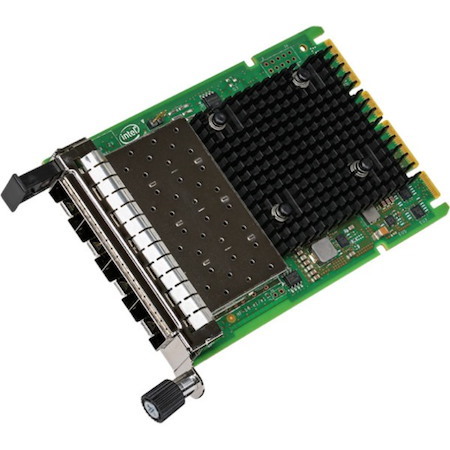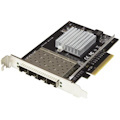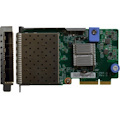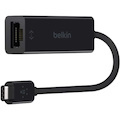The Intel® Ethernet Network Adapter X710-DA2 and -DA4 for OCP 3.0 provide broad interoperability, critical performance optimizations, and increased agility for Communications, Cloud, and Enterprise IT network solutions.
- Interoperability - Multiple speeds and media types for broad compatibility backed by extensive testing and validation.
- Optimization - Intelligent offloads and accelerators to unlock Network performance in servers with Intel® Xeon® processors.
- Agility - Both Kernel and Data Plane Development Kit (DPDK) drivers for scalable packet processing.
The OCP NIC 3.0 specification defines a standardized design for a new generation of network adapters. Simple and straightforward form factors, clear manageability requirements, and improved serviceability help simplify deployment for current and emerging capabilities.
The Intel® Ethernet 700 Series delivers networking performance across a wide range of network port speeds through intelligent offloads, sophisticated packet processing, and quality open source drivers.
All Intel® Ethernet 700 Series Network Adapters include these feature-rich technologies:
Flexible and Scalable I/O for Virtualized Infrastructures
Intel® Virtualization Technology (Intel® VT), delivers outstanding I/O performance in virtualized server environments.
I/O bottlenecks are reduced through intelligent offloads, enabling near-native performance and VM scalability. These offloads include Virtual Machine Device Queues (VMDq) and Flexible Port Partitioning using SR-IOV with a common Virtual Function driver for networking traffic per Virtual Machine (VM). Host-based features supported include:
VMDQ for Emulated Path: VMDQ, enables a hypervisor to represent a single network port as multiple network ports that can be assigned to the individual VMs. Traffic handling is offloaded to the network controller, delivering the benefits of port partitioning with little to no administrative overhead by the IT staff.
SR-IOV for Direct Assignment: Adapter-based isolation and switching for various virtual station instances enables optimal CPU usage in virtualized environments.
- Up to 128 virtual functions (VFs), each VF can support a unique and separate data path for I/O related functions within the PCI Express hierarchy.
- Use of SR-IOV with a networking device, for example, allows the bandwidth of a single port (function) to be partitioned into smaller slices that can be allocated to specific VMs or guests, via a standard interface.
Enhanced Network Virtualization Overlays (NVO)
Network virtualization has changed the way networking is done in the data center, delivering accelerations across a wide range of tunneling methods.
VxLAN, GENEVE, NVGRE, MPLS, and VxLAN-GPE with NSH Offloads: These stateless offloads preserve application performance for overlay networks, and the network traffic can be distributed across CPU cores, increasing network throughput.
- General Information
- Manufacturer
- Intel Corporation
- Manufacturer Website Address
- http://www.intel.com
- Brand Name
- Intel
- Product Series
- 700
- Product Type
- 10Gigabit Ethernet Card
- Technical Information
- Chipset Manufacturer
- Intel
- Chipset Model
- XL710-BM1
- Interfaces/Ports
- Host Interface
- PCI Express 3.0 x8
- Total Number of Ports
- 4
- I/O Expansions
- Expansion Slot Type
- SFP+
- Media & Performance
- Media Type Supported
- Optical Fiber
- Maximum Data Transfer Rate
- 10 Gbit/s
- Network & Communication
- Network Technology
- 10GBase-SR
- 10GBase-LR
- Physical Characteristics
- Form Factor
- Plug-in Card
- Bracket Height
- OCP
- Miscellaneous
- Application/Usage
- Network
- Device Supported
- Server
- Environmentally Friendly
- Yes
- Environmental Compliance
- Restriction of Hazardous Substances (RoHS)





